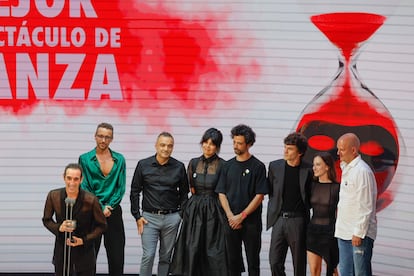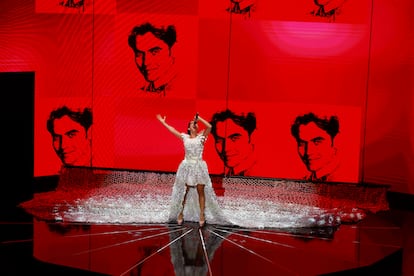A shower of awards for dance on the big night of the Max Awards

It seemed like a tradition that the Max Awards , the most prestigious performing arts awards in Spain, organized by the General Society of Authors and Editors (SGAE), were distributed equally among the nominees. You'd have to go back to 2016 to find a gala where a single show received more than three awards, when Pinoxxio won seven. This year, at Pamplona's Gayarre Theater, where the awards ceremony was held for the first time on Monday night, this tradition was broken. And so did dance. Afanador , the blockbuster production by the Spanish National Ballet , directed by Marcos Morau, the country's most internationally acclaimed and sought-after choreographer, triumphed with five awards. From the outset, it was the most nominated show with eight nominations, three more than Natural Order of Things , another dance production, which took home three.
The evening began with Afanador receiving the award for Best Musical Composition for a Stage Show. Later, it won Best Costume Design; Best Lighting Design; the top prize in its discipline; Best Dance Show; and finally—taking the prize from the theater—Best Stage Direction for Morau, who was absent from the gala .
The other big star of the night was "Natural Order of Things ," a show by Guy Nader and María Campos, which took home three awards, although the evening missed the presence of its stars, who were touring the show around the country. They took home the awards for best male and female dancer, for Alfonso Aguilar and María Campos, respectively, and best choreography for Guy Nader and María Campos. These included some of the most applauded words of the night. Aguilar dedicated his award to Maximiliano Corrales, a Mexican dancer and choreographer who was murdered in his country in 2023. "I danced, I laughed, I was surprised by life with you. To you, I offer my dance as a tribute, since you were denied the right to life," the award-winning dancer read. Nader, for his part, also speaking through a representative, defended his craft, dance, "the younger sister of the performing arts, the one with the least space and the one that has to fight the hardest for a decent budget." "We need more than applause," the choreographer wrote.

The gala then descended into a long, monotonous period, with lesser awards presented and dance, circus, and theater performances. The ceremony began with Aurora Beltrán on guitar and vocals performing Mañana , the song by Tahures Zurdos. La Faktoría was also performed with the voices of the Saudae Choir of Pamplona, and Iruñeco dantzariak, Basque dances, and a group of actors recited texts by Spanish authors, from Lorca to Juan Mayorga, including Quevedo and María Folguera.
But almost two hours had to pass before the most exciting moment of the night arrived. Actress Petra Martínez took the stage to receive the honorary award that the SGAE (Spanish Society of Spanish Artistic Society) presented to her and her partner, Juan Margallo, who died in April of this year, just weeks after learning they would be honored. Emblems of Spanish independent theater, it's hard to talk about them without linking their names. So much so that in 2022, as now, the two together won the National Theater Award. They are also the longest-running and most beloved couple on Spanish stages. And the Gayarre Theater proved it. Martínez received a double, lengthy round of applause from a standing audience, which the actress had to stop before she began speaking. "It's hard for me because I'm teary-eyed. When we received the news that we would receive this award, Juan and I were happy. I don't really like awards, but this one is beautiful. They gave it to us for 60 years of work," she said. Then she recalled her story, that of the Tábano group, that of the end of the Transition, that of the Spanish theater she performed for so many years with her life and work partner. “Juan and I have had so much fun; theater has been fun for us,” she continued. The audience shed the tears she held back when she remembered Margallo: “We have been happy, content, and he died. At that moment, you get angry and you curse everything you can curse. It sucks to die, but it's worse to stay alive when someone so dear to you dies.” And she ended with a shout: “Long live free Palestine!”

It was the theater's turn in the second part of the gala. Casting Lear , the theatrical experiment conceived and directed by Andréa Jiménez, in which a different actor took to the stage each night without knowing what they were going to say or do, won for Best Theater Show and Best Adaptation of a Play or Choreography, for Jiménez's text in collaboration with Juan Mayorga. An exercise in live stage creation, a different actor takes to the stage each night to compose the character of King Lear live, without prior knowledge and with the help of an earpiece, accompanied by Jiménez herself. "Thank you to the 35 actors who have dared to jump into the abyss with me," said the director.
Ágata Roca won Best Actress for her work in L'imperatiu categòric , and Enriq Auquer won Best Actor for his role in El día de Watus i, his first leading role in theater. "This goes out to all the people who were on the sidelines during that cursed transition in this country," the actor said. He won over Juan Vinuesa, the favorite (he won the Talía and the Godot), who played Francisco Franco in 1936 , the long-running play that recreates some of the events of the Civil War on stage. The show from the Centro Dramático Nacional had won six awards at the Talía and five at the Godot, including Best Theater Show at both. Here, perhaps as a result of a clear intention to decentralize the awards, it arrived at the gala with only two nominations: one for Vinuesa and another for the playwrights. It came away empty-handed. The award for playwright went to Itziar Pascual for Pepito , marking the first time this prize has been awarded to a work aimed at family audiences. “Perhaps theater can't change things, but perhaps it can send a message of support, care, respect, and love to children,” Pascual said.
There weren't many moving speeches. Almost all of them were formal thank-yous with constant but lukewarm mentions of the conflict in Gaza. Perhaps the most heartfelt was that of the stars of Farra , the best musical or lyrical performance: "We want to celebrate the end of any kind of abuse of power, the end of the genocide in Gaza," they said, before singing a short fragment of their performance: "The word went to war and managed to stop it, that's why I came to Farra and this I want to celebrate." Also appearing were the president of the SGAE, Antonio Onetti, and the president of the SGAE Foundation, Juan José Solana, who gave the usual institutional speeches at galas like this. But they did so with Solana at the piano—both have spent years trying to turn around such a bureaucratic moment—while Onetti, walking between the seats, defended the work of artists over artificial intelligence. “AI works without a soul, without imagination, and without permission. Because this is the robbery of the century! Thank goodness this year AI won't be able to compete with President Solana's natural talent,” the president said.
The two-hour gala ended strangely, in a tone completely opposite to the ceremony: with electronic music by CastaZabal and the fleeting movements of the cameramen. Disco-like. A good prelude, though, to the party that followed.
All the winnersBest theater show
Casting Lear (Pirate Ship, Andrea Jiménez and Abbey Theater).
Best Dance Show
Afanador (National Ballet of Spain).
Best Musical or Opera Performance
Farra (Lucas Escobedo Company and National Classical Theater Company – INAEM).
Best Street Performance
Fugit (Kamchatka).
Best show for children, youth or family audiences
A Christmas Carol (encapsulating Dickens).
Best New Show
Against Ana (The Contrary).
Best playwriting
Itziar Pascual, by Pepito.
Best New Author
Ester Guntín, by Quiso negro .
Best adaptation or version of a theatrical or choreographic work
Andrea Jiménez and Juan Mayorga, by Casting Lear .
Best Musical Composition for a Stage Show
Juan Cristobal Saavedra, Enrique Bermudez, Jonathan Bermudez, Gabriel Georgio Gonzalez and Roberto Vozmediano, for Afanador.
Best Choreography
Guy Nader and María Campos, for Natural order of things .
Best production work
La Fam Teatre, by Ambulant .
Best Stage Direction
Marcos Morau, by Afanador.
Best Stage Space and Video Scene Design
Victor Peralta, for Thauma.
Best Costume Design
Sílvia Delagneau, by Afanador.
Best Lighting Design
Bernat Jansà, for Afanador .
Best Actress
Agate Rock, by L'imperatiu categòric .
Best Actor
Enric Auquer, for The Day of the Watusi.
Best Female Dance Performer
María Campos, for Natural order of things .
Best Male Dance Performer
Alfonso Aguilar, for Natural order of things.
Max amateur or social character
Ignacio Aranguren and Vicente Galbete for their career as teachers of the School Theater Workshop at the Navarro Villoslada Institute in Pamplona.
Max applause from the audience
L'alegria que passa, latest creation of the Catalan company Dagoll Dagom
EL PAÍS





